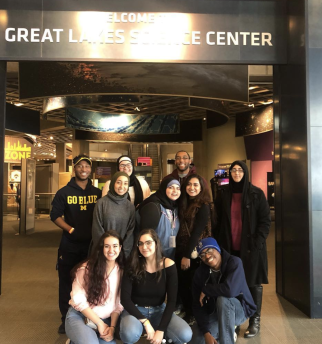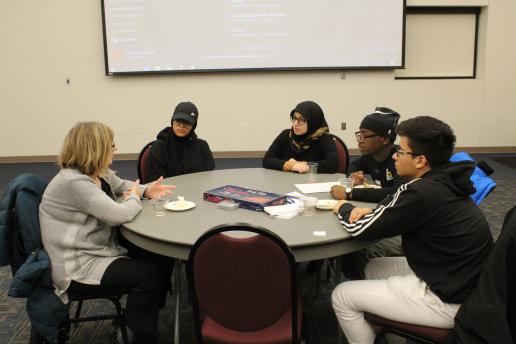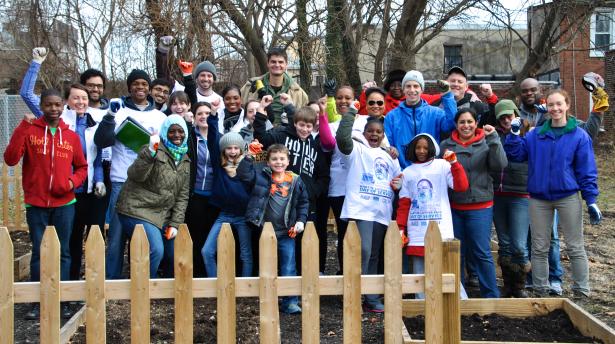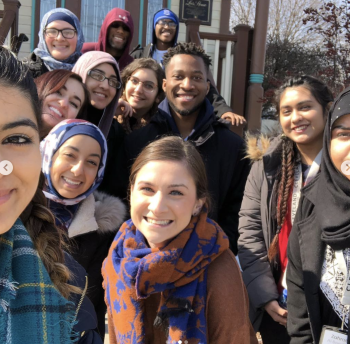Supporting Your Wolverine: Parent and Family Engagement
Quite simply, families are our partners. Together, we support your student’s intellectual and personal growth — and we're here to connect you with the information and resources you need.
Sending your Wolverine off to school isn't just a new experience for them, but a new experience for you too. As your student takes on adult responsibilities, your role will change, but your student still needs you. Students need you to support their growth, development, and independence, and to be a stable force in their ever-changing world. On occasion, they even need your advice—but they may or may not ask for it.
We know you have worked so hard to support your student in becoming a Wolverine. And we know that your student's success is not a coincidence. We believe in partnering with you to support your student and we consider you part of the UM-Dearborn family as well. There are a number of ways you can be involved, stay connected, and help your student navigate college life. Whatever your needs or interests are, we hope you find what you are looking for, but if you don't please feel free to reach out and ask us.




Your student is beginning a new journey of independence at a major, urban research institution. College is very different from high school and students sometimes have a difficult time adjusting to all of the changes they are experiencing. We understand how important it is for you as a parent or family member(s) to understand the changes your students are going through and how you can assist in a successful transition.
Be Supportive
Adjusting to college life and all of the new experiences your student will face, requires a supportive network of family and friends. Be as supportive as you have all the other times your student changed life stages.This is a big step for both you and your student. When they experience successes as well as disappointments, both your student and the University community will want you there to encourage them, congratulate them, and help guide them back to their initial goal of completing their education.
Be Observant of Time Commitments.
The first year of college is very different than high school. Thus, the adjustment to increased homework and academic expectations can be a bit overwhelming. This means an adjustment to their schedules—less time for play! More time will need to be devoted to studying. Eight hours to study is the minimum amount of time to study for academic success. This doesn’t mean there’s no time for play—it just means balancing priorities and staying focused on the goal!
Ask Questions
It’s okay to ask questions. Although your student is taking their first step of independence as a college student, they may still rely on your wisdom. So ask them how their classes are going; how are things working out with making friends. Be ready to offer advice.
Listen and Comfort
During the adjustment to college, your student may become frustrated. The easiest way to respond is to carefully listen and reassure them there is a light at the end of the tunnel. Sometimes, they just need to “vent” their frustrations so be a sounding board and comfort them.
Get to Know Faculty
Many first-year students are “hesitant” to approach their professors and faculty in general. Encourage your student to get to know a faculty member. Faculty makes great mentors.
Encourage Campus Involvement
Research shows that campus involvement is one of several predictors of degree completion. College is more than classes and homework. A successful balance to student success includes connecting to other students. We highly suggest that students join at least one student organization in their first semester. Volunteerism and involvement on campus build leadership skills they can transfer to their future career(s).
8) Talk about financial matters
Students are often solicited by credit card companies. It’s always good to help keep your student on track by talking about their budget and financial obligations.
The University of Michigan - Dearborn provides a number of Health & Wellness resources for your student, many of which have been expanded during the pandemic, including:
- University Health Service offers health care and individual wellness coaching to support students' well-being
- Well-Being for Students is a helpful resource page for information and wellness tips.
In addition, here’s a look at other resources available for your student:
- Counseling and Psychological Services (CAPS) CAPS provides services that advance student success by promoting emotional wellness and psychological development by providing culturally competent, high quality, and confidential mental health services, prevention and educational programming, campus wide consultation, crisis response, and outreach. Staff and trainees are committed to providing a safe, welcoming and affirming environment for all students. CAPS is located in the 2nd Floor of the University Center (2157UC) and is open (virtuall) to assist with your students’ needs Monday-Friday, 8 a.m.- 5 p.m. CAPS can be reached by phone (313-593-5430) and email ([email protected]).
- View the CAPS Winter 2021 Message
- UM-Dearborn Counseling & Psychological Services (CAPS) After Hours Crisis Line: 1-855-275-1715
- During regular business hours reach CAPS at 313-593-5430
- 313-593-5333 Campus Police
- 800-273-8255 National Suicide Hotline
- 734-721-0200 Psychiatric Intervention Center
- 800-799-7233 National Domestic Violence Hotline
- -----------------------------------------------------------------------------------
- Dearborn Support is a resource available to students, parents/families, and faculty/staff who have questions about student support and assistance and/or who are concerned about a student’s well-being. Dearborn Support can be reached by phone at 313-593-5056 or by email, [email protected].
- The Center for Social Justice and Inclusion's mission the University of Michigan-Dearborn’s Center for Social Justice and Inclusion is to value and celebrate the uniqueness of each individual. We seek to remove barriers by providing programs and activities that will enable all students to meet their full potential, and experience meaningful involvement on campus and in the community.
How does your student get involved in a true college experience? Meeting people, participating in Student Orgs, volunteering, and just getting involved is so essential to the campus equation.
The University of Michigan-Dearborn's Campus Life website is available to help by providing many options for getting involved either virtually or through in person activities.
The site has suggestions for a variety of interests, including those who want to:
- Join a student organization
- Join a fraternity or sorority
- Connect with others and exercise
- Connect with others and volunteer
- Learn about leadership opportunities
- Connect with resources during a difficult time
For UM-Dearborn events, your student can also check out Victors Link.

Study.com is a leading online education resource making learning accessible for over 30 million students and educators a month. The team at Study.com recently developed several comprehensive guides for students getting ready to make the transition to college. These four guides can be incredibly beneficial for students as they start to plan for college and their future careers:
